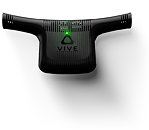
Intel, AMD, and HTC Partner to Resolve Vive Wireless Adapter Compatibility Issue with Ryzen Processors
The headline of this post makes it seem a touch more innocuous than the story may lead to, at least if you believe the rumor mills abound. There has been an ongoing issue with AMD systems using Ryzen CPUs and the HTC Vive wireless adapter (powered by Intel WiGig) to where the systems have frozen or even had a BSOD. HTC acknowledged this as early as Nov, 2018, noting that they have seen this with a subset of Ryzen-based motherboards when the PCIe wireless adapter is installed and running. It took until last week to get a solution of sorts, and unfortunately reports from users indicate this is not a true fix for everyone.
The hotfix update 1.20190410.0 was made available April 25 to attempt to combat this issue, which was garnering a lot of attention in the VR-community on whether there was more Intel could be doing to help AMD customers. This hotfix update is available automatically once an end user with the Vive wireless adapter checks for an update, and HTC acknowledge that they continue to test this, as well as partner with Intel and AMD to help resolve this once and for all. In the meantime, users report mixed success to date, including some we know personally as well, and it remains a thorn in the side of wireless VR to get to the PC successfully.
The hotfix update 1.20190410.0 was made available April 25 to attempt to combat this issue, which was garnering a lot of attention in the VR-community on whether there was more Intel could be doing to help AMD customers. This hotfix update is available automatically once an end user with the Vive wireless adapter checks for an update, and HTC acknowledge that they continue to test this, as well as partner with Intel and AMD to help resolve this once and for all. In the meantime, users report mixed success to date, including some we know personally as well, and it remains a thorn in the side of wireless VR to get to the PC successfully.




